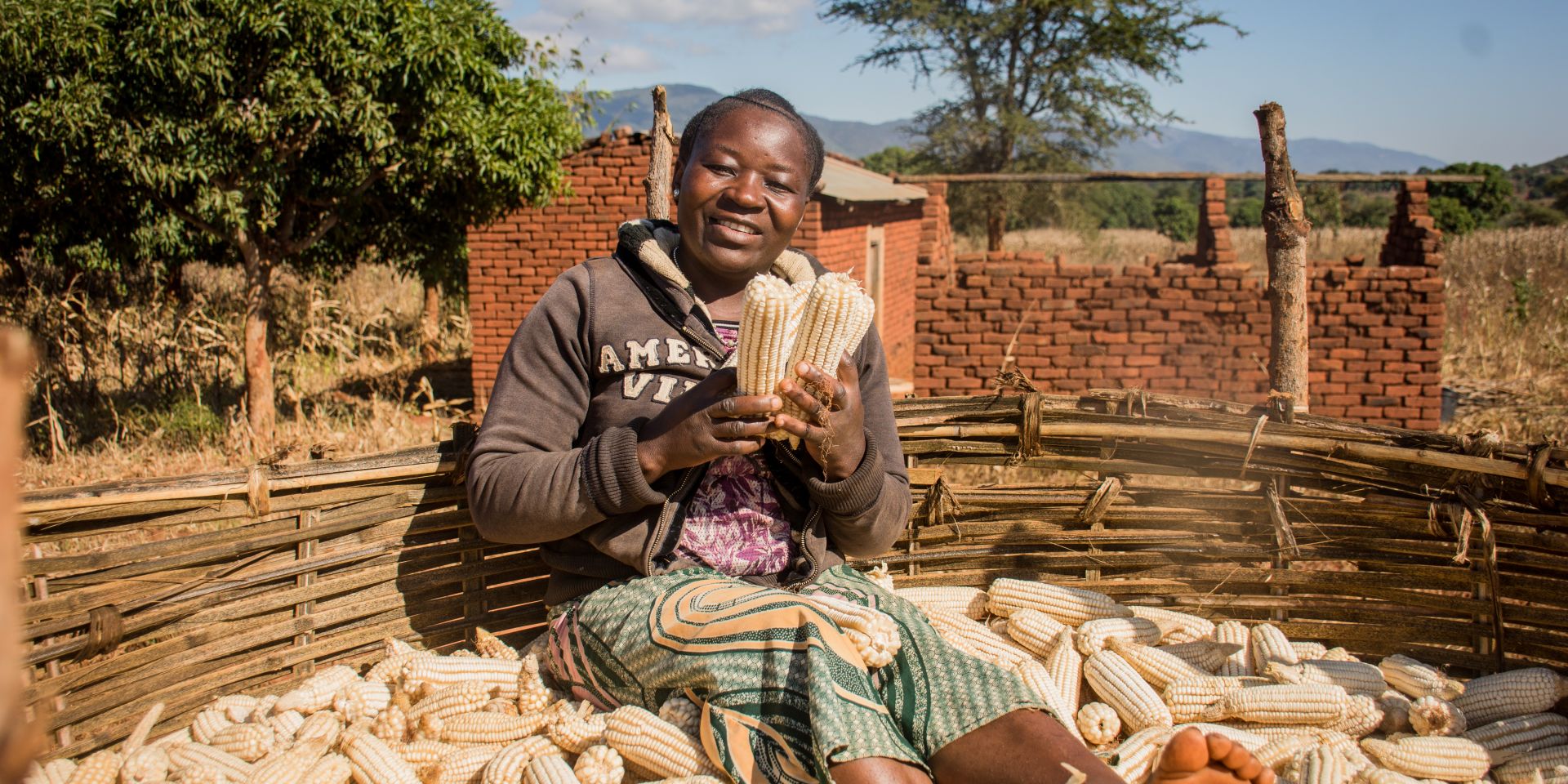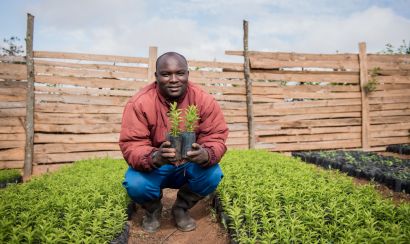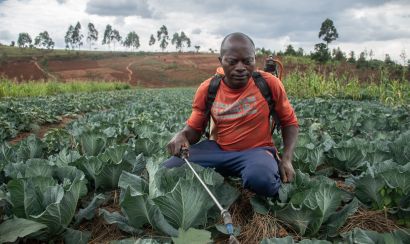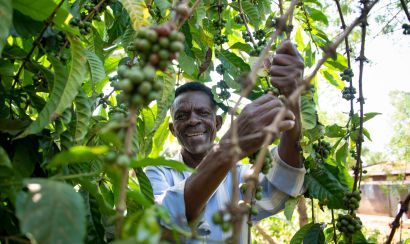Investing in a new generation of farming entrepreneurs
In Sub-Saharan Africa, around half of the region’s workforce engages in farming, many on less than an acre of land. It’s hard work, and farmers are vulnerable to changes in weather and prices for their crops. As a result, youth often see farming as just a way to eat and get by, not as a potential business venture.
If I didn’t know any better, farming as a career might discourage me too. But, through my work with farmers for nearly 20 years, I know that agriculture provides one of the most promising avenues for income generation and food security. Even with modest plots of land, smallholder farmers produce significant amounts of food and one-fifth of the gross domestic product in Sub-Saharan Africa. And because the vast majority of rural communities depend on farming for their livelihoods, agriculture is several times more effective than other economic sectors in reducing poverty.
The need for farmers will only continue to grow. By 2050, 1 in 4 people worldwide will live in Sub-Saharan Africa and the continent’s population is expected to double. Globally, we’ll need to produce 60 percent more food to feed our growing population.
Now, more than ever, the world needs farmers. And personally, I believe the future of farming belongs to the young. I see enormous opportunities for agriculture to become more digital, more commercial, and more adaptable. In my experience living in rural areas for 12 years, these are all trends that favor young farmers.
Agriculture is becoming more digital
Digital and technological innovations are making farming more efficient and providing new opportunities and services for young entrepreneurs. Farming, both on small and large scales, is increasingly about digitally-enabled information and decision-making. This trend favors the young.
Few occupations depend more on having timely and accurate weather information than farming. At One Acre Fund, we’re trialing using satellite imagery, global positioning, and smart sensors to collect real-time data on crops and weather events. With this data, we hope to help farmers better manage weeds and pests, optimize farm inputs, and target planting timing – reducing costs and producing healthier plants. Innovations like this can help many individuals shift their farms from subsistence to budding enterprises.
Using technology also gives farmers the flexibility to get farm services whenever they need them. We are currently trialing a smartphone app in Kenya, Tupande Online, which allows farmers to order farm products all year round. In the future, we will help farmers access personalized farming advice on-demand and connect with other farmers and buyers for their crops. This will help farmers apply best practices and improve yields, climate resilience, and livelihoods.
Agriculture is becoming more commercial
Farmers produce and consume food – additionally, in today’s world of global trade, they should have access to a menu of commercial opportunities to grow for profit. All farmers should have a right to build a diverse portfolio of both staple foods and commercial crops - and we see strong interest in this from younger farmers.
At One Acre Fund, we have been trialing market access opportunities to increase farmers’ earnings from their harvests. We provide market access solutions for staples like maize and potatoes and high-value crops like Hass avocado, macadamia, soybeans, and chickens.
In Kenya, we’re helping smallholder farmers access export value chains for potatoes, avocados, and macadamia. We work with farmers to collect, process, and package macadamia nuts and ship them to Europe. So far, we’ve sourced 2,500 tons since 2021 and hope to source 10,000 tons by 2025. We also help farmers access markets in Europe directly by training them on export market standards, harvesting, paying on the spot, and managing the operations up to supermarkets in destination markets.
In Rwanda, over the past two years, we have invested in research and development efforts on chickens and high-value crops like avocado to help farmers build from subsistence to commercial farming. Working with private sector partners, we have sold more than 150,000 chickens and are in the early stages of helping to set up avocado value chains. In the medium term, we hope to work with local avocado oil processing industries and serve more farmers who have different grades and varieties of fruit. We are also exploring farmer certification, allowing us to venture into export markets with higher margins that can be passed back to farmers.
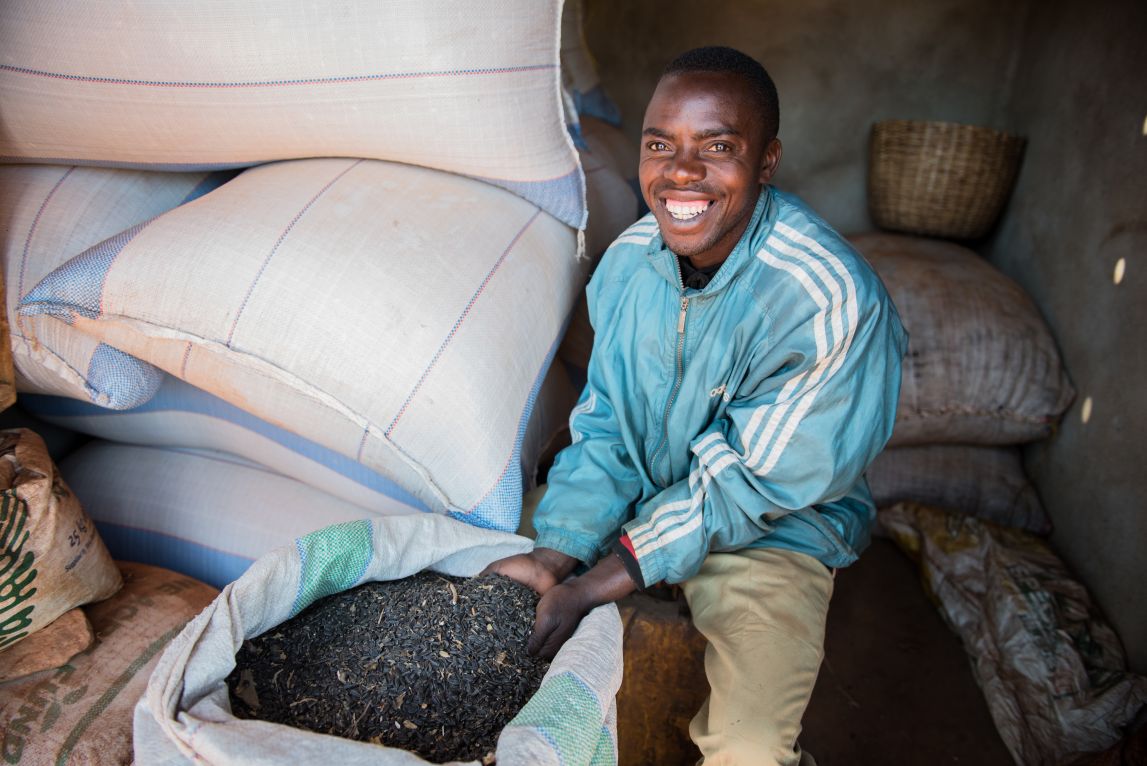
Laban Chaula, a smallholder farmer from Kilolo District, Tanzania, exemplifies what a healthy, financially rewarding food system can help farmers accomplish. When he enrolled in our input and training program in 2020, Laban’s more than doubled his maize yields from five bags to 12 per acre.
Last year, with predictions of decreased rainfall due to weather and climate changes, Laban attended a training where One Acre Fund advised farmers to plant early maturing crops such as sunflower, prompting him to enroll. “I harvested eight bags of sunflower, which I am planning to sell and reinvest the income into farming and in my children’s education,” Laban says.
For Laban and others like him, diversifying his farmed crops enables him to fulfill his nutritional needs, adapt to climate change, and unlock higher profits, which means a more secure livelihood.
Agriculture is becoming more adaptable
The youngest generation is the most keenly aware of climate change. As our climate changes, we can help farmers to select activities for their farm portfolio that help them to adapt to changing weather conditions – and to invest in their long-term soils and farm environment. We champion climate-smart farming approaches so farmers can reap strong harvests both today and in the future - including stewardship of soil health, planting more trees, and offering financial instruments like insurance.
Crop diversification is a particularly important coping mechanism for climate change. By growing a broader range of crops, farmers can reduce the risks of unfavorable weather or market shocks. It also ensures a steadier income stream throughout the year, as harvests ripen at different times. Nutritionally, it creates a more diverse diet for farm families. This relatively simple change brings significant health and nutritional benefits to farming households and communities.
Support young farmers!
Agriculture is a big part of the answer to youth unemployment worldwide. We must empower a new generation of farmers to grow more food and earn more money. As young people face the future, we can support them to be ready for challenges like climate change and economic shifts by expanding funding, training, and access to on-farm technology.
There are many practical things we can do to help young farmers. Investing in the future of farming is as important as investing in money markets or infrastructure; it is key to addressing the challenges we face in agriculture today – from sustainably feeding the world’s growing population to finding lasting solutions to resilient, profitable agriculture.
